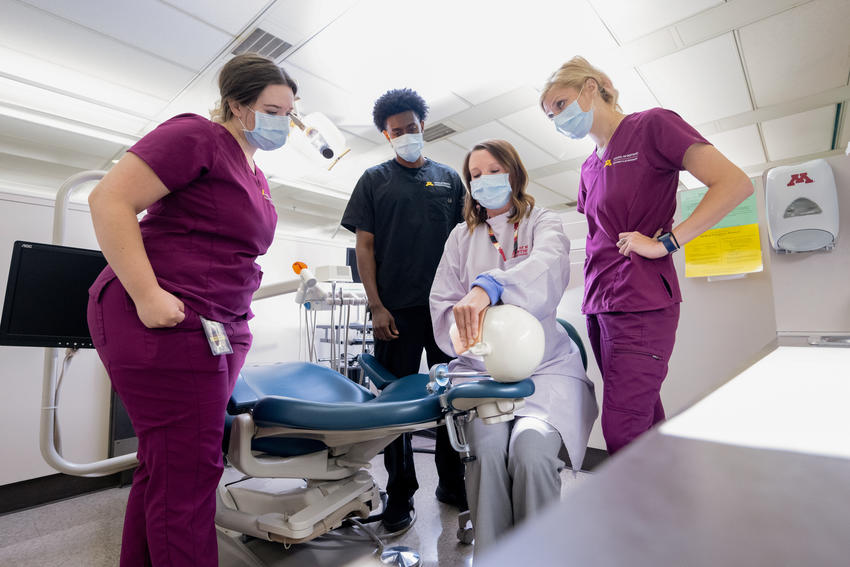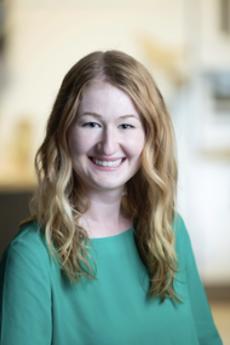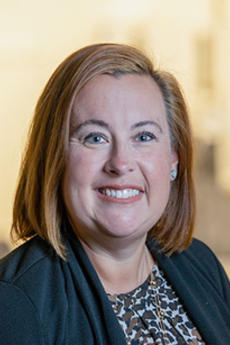TEATL grant paves way for improved clinical licensure preparation

Yvette Reibel, EdD, LDH, clinical associate professor and clinic director of the Division of Dental Hygiene, and Rachel Thelen, MSDH, LDF, RF, clinical assistant professor of dental hygiene, received a Technology Enhanced Award for Teaching and Learning through the School of Dentistry for their work in improving the clinical license examination preparation sequence for dental hygiene learners.
Clinical licensure examinations, also known as CDCA, are a major part of the dental hygiene experience, representing one of the final steps that allows learners to practice clinically upon graduation. During the COVID-19 pandemic, these examinations moved from taking place on patients to a simulated format using typodonts and manikins—and the change has remained in place.
Recognizing that the best way to set learners up for success was to prepare them with plenty of practice, the Division of Dental Hygiene began incorporating typodonts into their dental hygiene calculus detection and removal competency examinations. Unfortunately, the typodonts on hand were not made for this kind of advanced use.
“The anatomy of our existing typodonts was not realistic to a patient, and many teeth broke during the examination,” explained Thelen. “This made for a poor experience for some students, and we knew we had to make a switch.”
Thelen and Reibel came across the Acadental Coris typodont at the 2022 American Dental Education Association conference, and knew they had found the right tool. The one remaining piece of the puzzle was how to pay for them.
Reibel learned of the TEATL grant from another colleague whose research received a previous award, and thought it was the perfect solution.
TEATL grants provide funds to full-time faculty members interested in supporting the acquisition of new technology that will impact the teaching and learning environments of the institution.
In this case, “the funds will allow us to purchase newly-designed typodonts that can withhold the forces of instrumentation during deposit removal,” she said.
Thelen and Reibel were thrilled to find out that they had received the award. “We were so excited to receive this grant, which makes it possible for our department to purchase enough typodonts for all our students,” Thelen said. “We are also excited for our students to have a better exam experience.”
Because other programs throughout the nation are grappling with how best to prepare learners for the change, this instrumentation will serve not only as a teaching aid, but also as a study of the division’s newly-implemented four-semester competency plan in the curriculum.
“We will assess the effectiveness of the curriculum by tracking students’ success not only on the semester competency exam and their perceptions of preparedness, but also by assessing students’ clinical simulated licensure exam during their last semester in the program,” Reibel explained.
More specifically, Reibel and Thelen plan to measure student confidence in how well the competency examination sequence prepared them for clinical licensure, comparing the Class of 2023—who completed their examination sequence on the old typodonts—with the Class of 2024—who have access to the new model.
“We are excited to see if there is a difference in confidence around the CDCA exam,” said Thelen. “We are also excited for this research because as far as we are aware, we are the only hygiene program in the state to be administering this style of competency exam sequence and using the newest Coris models.”
And most of all, they are pleased to have the opportunity to improve student learning experiences while furthering the field.
“I am so happy to see that the School of Dentistry has funding sources available for faculty to implement new technologies and curriculum plans that enhance student learning and success with clinical licensure exams,” said Reibel. “This speaks to the dedication we have to the success of our students.”

